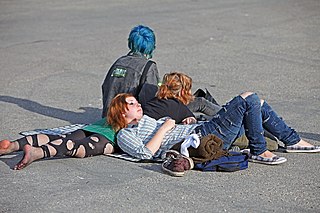
In sociology, socialization is the process of internalizing the norms and ideologies of society. Socialization encompasses both learning and teaching and is thus "the means by which social and cultural continuity are attained".
Transculturation is a term coined by Cuban anthropologist Fernando Ortiz in 1940 to describe the phenomenon of merging and converging cultures. Transculturation encompasses more than transition from one culture to another; it does not consist merely of acquiring another culture (acculturation) or of losing or uprooting a previous culture (deculturation). Rather, it merges these concepts and instead carries the idea of the consequent creation of new cultural phenomena (neoculturation) in which the blending of cultures is understood as producing something entirely new.
Acculturation is a process of social, psychological, and cultural change that stems from the balancing of two cultures while adapting to the prevailing culture of the society. Acculturation is a process in which an individual adopts, acquires and adjusts to a new cultural environment as a result of being placed into a new culture, or when another culture is brought to someone. Individuals of a differing culture try to incorporate themselves into the new more prevalent culture by participating in aspects of the more prevalent culture, such as their traditions, but still hold onto their original cultural values and traditions. The effects of acculturation can be seen at multiple levels in both the devotee of the prevailing culture and those who are assimilating into the culture.

Cultural identity is a part of a person's identity, or their self-conception and self-perception, and is related to nationality, ethnicity, religion, social class, generation, locality, gender, or any kind of social group that has its own distinct culture. In this way, cultural identity is both characteristic of the individual but also of the culturally identical group of members sharing the same cultural identity or upbringing. Cultural identity is an unfixed process that is continually evolving within the discourses of social, cultural, and historical experiences. Some people undergo more cultural identity changes as opposed to others, those who change less often have a clear cultural identity. This means that they have a dynamic yet stable integration of their culture.
Ritualization refers to the process by which a sequence of non-communicating actions or an event is invested with cultural, social or religious significance. This definition emphasizes the transformation of everyday actions into rituals that carry deeper meaning within a cultural or religious context. Rituals are symbolic, repetitive, and often prescribed activities that hold religious or cultural significance for a certain group of people. They serve various purposes: promoting social solidarity by expressing shared values, facilitating the transmission of cultural knowledge and regulating emotions.
Intercultural communication is a discipline that studies communication across different cultures and social groups, or how culture affects communication. It describes the wide range of communication processes and problems that naturally appear within an organization or social context made up of individuals from different religious, social, ethnic, and educational backgrounds. In this sense, it seeks to understand how people from different countries and cultures act, communicate, and perceive the world around them. Intercultural communication focuses on the recognition and respect of those with cultural differences. The goal is mutual adaptation between two or more distinct cultures which leads to biculturalism/multiculturalism rather than complete assimilation. It promotes the development of cultural sensitivity and allows for empathic understanding across different cultures.

The sociology of culture, and the related cultural sociology, concerns the systematic analysis of culture, usually understood as the ensemble of symbolic codes used by a member of a society, as it is manifested in the society. For Georg Simmel, culture referred to "the cultivation of individuals through the agency of external forms which have been objectified in the course of history". Culture in the sociological field is analyzed as the ways of thinking and describing, acting, and the material objects that together shape a group of people's way of life.
Cultural learning is the way a group of people or animals within a society or culture tend to learn and pass on information. Learning styles can be greatly influenced by how a culture socializes with its children and young people. Cross-cultural research in the past fifty years has primarily focused on differences between Eastern and Western cultures. Some scholars believe that cultural learning differences may be responses to the physical environment in the areas in which a culture was initially founded. These environmental differences include climate, migration patterns, war, agricultural suitability, and endemic pathogens. Cultural evolution, upon which cultural learning is built, is believed to be a product of only the past 10,000 years and to hold little connection to genetics.

A sociological theory is a supposition that intends to consider, analyze, and/or explain objects of social reality from a sociological perspective, drawing connections between individual concepts in order to organize and substantiate sociological knowledge. Hence, such knowledge is composed of complex theoretical frameworks and methodology.

The sociology of education is the study of how public institutions and individual experiences affect education and its outcomes. It is mostly concerned with the public schooling systems of modern industrial societies, including the expansion of higher, further, adult, and continuing education.

Cultural reproduction, a concept first developed by French sociologist and cultural theorist Pierre Bourdieu, is the mechanisms by which existing cultural forms, values, practices, and shared understandings are transmitted from generation to generation, thereby sustaining the continuity of cultural experience across time. In other words, reproduction, as it is applied to culture, is the process by which aspects of culture are passed on from person to person or from society to society.
The following outline is provided as an overview of topics relating to community.
Education sciences, also known as education studies, education theory, and traditionally called pedagogy, seek to describe, understand, and prescribe education including education policy. Subfields include comparative education, educational research, instructional theory, curriculum theory and psychology, philosophy, sociology, economics, and history of education. Related are learning theory or cognitive science.
Integrative communication theory is a theory of cross-cultural adaptation proposed by Young Yun Kim. The first widely published version of Kim's theory is found in the last three chapters of a textbook authored by William Gudykunst with Young Yun Kim as second author. See acculturation and assimilation.

Culture is a concept that encompasses the social behavior, institutions, and norms found in human societies, as well as the knowledge, beliefs, arts, laws, customs, capabilities, attitudes, and habits of the individuals in these groups. Culture often originates from or is attributed to a specific region or location.

Educational anthropology, or the anthropology of education, is a sub-field of socio-cultural anthropology that focuses on the role that culture has in education, as well as how social processes and cultural relations are shaped by educational settings. To do so, educational anthropologists focus on education and multiculturalism, educational pluralism, culturally relevant pedagogy and native methods of learning and socializing. Educational anthropologists are also interested in the education of marginal and peripheral communities within large nation states. Overall, educational anthropology tends to be considered as an applied field, as the focus of educational anthropology is on improving teaching learning process within classroom settings.
Ethnoscience has been defined as an attempt "to reconstitute what serves as science for others, their practices of looking after themselves and their bodies, their botanical knowledge, but also their forms of classification, of making connections, etc.".
In sociology and other social sciences, internalization means an individual's acceptance of a set of norms and values through socialisation.
Social anthropology is the study of patterns of behaviour in human societies and cultures. It is the dominant constituent of anthropology throughout the United Kingdom and much of Europe, where it is distinguished from cultural anthropology. In the United States, social anthropology is commonly subsumed within cultural anthropology or sociocultural anthropology.

Legal socialization is the process through which, individuals acquire attitudes and beliefs about the law, legal authorities, and legal institutions. This occurs through individuals' interactions, both personal and vicarious, with police, courts, and other legal actors. To date, most of what is known about legal socialization comes from studies of individual differences among adults in their perceived legitimacy of law and legal institutions, and in their cynicism about the law and its underlying norms. Adults' attitudes about the legitimacy of law are directly tied to individuals' compliance with the law and cooperation with legal authorities.







